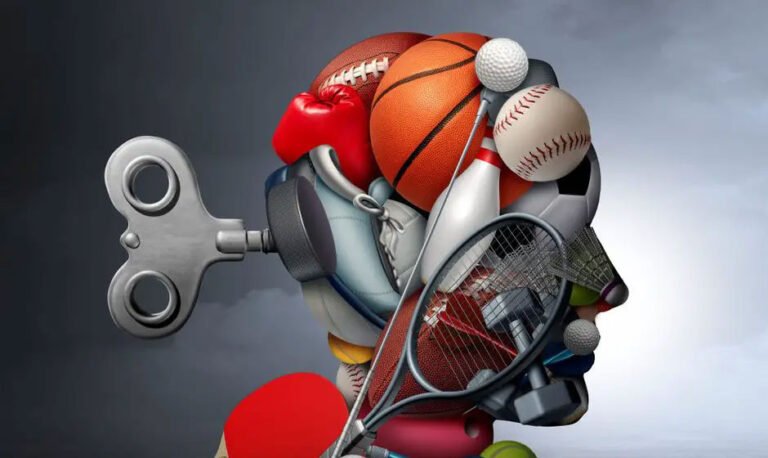For many athletes, achieving success means spending lots of time training their bodies, improving skills, and pushing their physical limits. But there’s something equally important that often gets forgotten: mental fitness. Sports psychology is all about studying how the mind affects performance and well-being in sports. Just like building a strong body takes hard work, developing mental toughness and mastering psychological skills can help athletes perform their best and reach their goals.
Positive Reinforcement in Sports Performance
Performance in sports isn’t just about physical ability. There are several important psychological factors that play a big role:
- Motivation and Goal Setting: Athletes are driven by different types of motivation. Intrinsic motivation comes from the joy of the sport itself, while extrinsic motivators like rewards also matter. Setting goals helps athletes stay on track and feel confident. For example, a gymnast might imagine a perfect routine or a soccer player might picture scoring the winning goal to stay motivated.
- Mental Toughness and Stress Management: It’s normal to feel nervous before a competition, but too much anxiety can hurt performance. Sports psychologists teach athletes techniques like relaxation and mindful breathing to handle stress. Mental toughness means bouncing back from setbacks and staying strong. Visualization helps athletes see themselves overcoming challenges, and positive self-talk boosts confidence.
- Confidence and Self-Belief: Believing in yourself is crucial. Positive self-talk replaces negative thoughts with encouraging words, building confidence. Visualizing success boosts self-belief and lets athletes practice winning in their minds.
- Attention and Focus: Athletes need to block out distractions and focus on the game. Techniques like meditation help them stay present and avoid worrying about the past or future. Controlling attention helps them react well and perform skills perfectly.
- Teamwork and Cohesion: In team sports, having a strong team mindset is key. Communication, trust, and shared goals are important. Sports psychologists help teams build positive relationships, communicate effectively, and work together towards success. A cohesive team celebrates together and supports each other to perform their best.
Negativity Can Also Affect Sports Performance
Unfortunately, injuries are a common part of an athlete’s experience. Besides the physical impact, injuries can take a toll on an athlete’s mental health. A personal injury lawyer in Seattle mentioned that the fear of getting hurt again can lead to anxiety, hesitation, and lower performance. Losing their identity and purpose tied to their sport can make athletes feel alone, frustrated, and even depressed. Watching teammates succeed while they’re sidelined can make these feelings worse.
Sports psychologists help athletes handle the ups and downs of dealing with injuries. They offer support and advice in:
- Dealing with Feelings: It’s important to acknowledge and accept emotions like fear, anger, and sadness. Techniques like cognitive-behavioral therapy help athletes change negative thoughts and find healthy ways to deal with anxiety and stress.
- Staying Motivated: Setting achievable goals and celebrating small wins during recovery keeps athletes motivated. Imagining a successful comeback to their sport boosts confidence and keeps them determined.
- Finding Identity: Athletes learn that their value goes beyond their sport. Exploring other interests and activities helps them feel purposeful and less alone during recovery.
- Building Toughness: Setbacks are part of the process, but learning from them makes athletes stronger and more resilient.
By addressing mental challenges along with physical recovery, sports psychologists help athletes bounce back quicker and perform better. This well-rounded approach leads to a faster and smoother return to peak performance.
Succeeding In Your Sport
These psychological factors are just as important as physical training in helping athletes succeed in their sport.
Sports psychology interventions are more than just discussions. Athletes can benefit from one-on-one counseling sessions to address personal struggles and mental barriers in a safe environment. Group workshops help teams bond, while mental skills training teaches practical techniques to manage anxiety, stay focused, and enhance performance. Research shows that these interventions have a positive impact on athletic performance, as seen in a 2021 study that found they were effective in maximizing potential.
The advantages of sports psychology extend beyond the playing field. Athletes also gain important life skills like handling stress, dealing with setbacks, and building self-confidence, which contribute to their overall well-being beyond sports. These skills are useful in other areas of life, such as academics, relationships, and career challenges.
Embracing sports psychology isn’t a sign of weakness; it’s a smart investment in reaching your full potential. Whether you’re an experienced athlete or just starting out, consider integrating sports psychology into your training routine. Just as you train your body, training your mind can help you become the best version of yourself.


